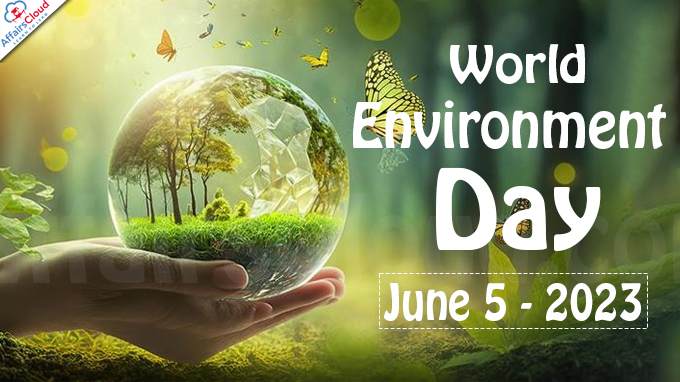 The United Nations (UN)’s World Environment Day (WED) is annually observed across the globe on 5th June to highlight the significance of protecting the environment. The day also creates awareness about the efforts taken by various stakeholders across the globe to address environmental issues.
The United Nations (UN)’s World Environment Day (WED) is annually observed across the globe on 5th June to highlight the significance of protecting the environment. The day also creates awareness about the efforts taken by various stakeholders across the globe to address environmental issues.
5th June 2023 marks the observance of the 50th World Environment Day.
The theme of the WED 2023 is “Solutions to Plastic Pollution”.
- The 2023 theme acts as a reminder that people’s actions on plastic pollution matter.
The annual observance of WED is led by the United Nations Environment Programme (UNEP), an environmental authority in the UN system, since 1973.
Host of WED 2023: The WED 2023 is hosted by Côte d’Ivoire and supported by the Netherlands.
#BeatPlasticPollution Campaign:
The WED 2023 campaign #BeatPlasticPollution calls for global solutions to combat plastic pollution.
Background:
The United Nations General Assembly(UNGA) adopted the resolution A/RES/2994 (XXVII) in 1972 and proclaimed the June 5th of every year as “World Environment Day”.
- The first-ever World Environment Day was observed on 5th June 1973.
Why June 5?
June 5th marks the inaugural day of the 1972 UN Conference on the Human Environment, the first world conference to make the environment a major issue, held in Stockholm, Sweden from 5 to 16 June 1972.
Key Points:
i.Globally, more than 400 million tonnes of plastic is produced annually and around 50% of these are designed to be used only once.
- Only about 10% of the plastics produced are recycled.
ii.An estimated 19-23 million tonnes of plastics end up in lakes, rivers and seas annually.
iii.Microplastics, plastic particles up to 5mm in diameter are found in air, water, soil, food, and inside our bodies.
iv.More than 800 marine and coastal species are affected by plastic pollution through ingestion, entanglement, and other dangers.
v.Annually, around 11 million tonnes of plastic waste flow into oceans and this is estimated to triple by 2040.
Note:
A shift to a circular economy can reduce the volume of plastics entering oceans by over 80% by 2040; reduce virgin plastic production by 55%; save governments USD70 billion by 2040; reduce greenhouse gas (GHG) emissions by 25%; and create 700,000 additional jobs.
About United Nations Environment Programme (UNEP):
Executive Director– Inger Andersen
Headquarters– Nairobi, Kenya




